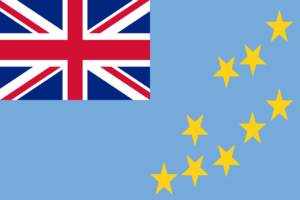Tuvalu is an island nation in the South Pacific. The islands were settled by Polynesians thousands of years ago. There was little contact with Europeans until the 19th century. In the 20th century, the area became part of a British colony.
During World War II, American troops were stationed on the island. The United States has established several air bases on various islands. Tuvalu became an independent state in 1978 and still maintains good relations with the United States.
| Capital | Funafuti |
| Population | 11,410 (Source: 2023 worldometer) |
| Major Cities | Funafuti (capital), Savave Village, Motufoua School, Teava Village, Tanrake Village, Tumaseu Village, Tokelau Village, Toga Village |
| Borders | Fiji to the south, Wallis and Futuna (France) to the southeast, Kiribati to the north and east, and Tokelau (New Zealand) to the east |
| Gross Domestic Product (GDP) | $60,349,391 (2022 worldometer) |
| Currency | Australian dollar (AUD); note – there is also a Tuvaluan dollar |

Tuvalu Major Industries: fishing, tourism, copra
Tuvalu Agricultural Products: coconuts; fish
Tuvalu Natural Resources: fish
Tuvalu Major Exports: copra, fish
Tuvalu Major Imports: food, animals, mineral fuels, machinery, manufactured goods
Total Size of Tuvalu: 26 km2 (source: 2022 wikipedia)
Geographical Low Point of Tuvalu: Pacific Ocean 0 m
Geographical High Point of Tuvalu: unnamed location 5 m
Climate of Tuvalu: Tropical; moderated by easterly trade winds (March to November); westerly gales and heavy rain (November to March)
General Terrain of Tuvalu: very low-lying and narrow coral atolls
World Region or Continent of Tuvalu: Oceania
Geographical Coordinates: 8 00 S, 178 00 E
Tuvalu Government Type: constitutional monarchy with a parliamentary democracy
Tuvalu Nationality: Tuvaluan(s)
Tuvalu National Holiday: Independence Day, 1 October (1978)
Tuvalu Independence: 1 October 1978 (from UK)
Tuvalu National Symbol:
Tuvalu National Anthem or Song: Tuvalu mo te Atua (Tuvalu for the Almighty)
Tuvalu Languages Spoken: Tuvaluan, English, Samoan, Kiribati (on the island of Nui)
Tuvalu Religions: Church of Tuvalu (Congregationalist) 97%, Seventh-Day Adventist 1.4%, Baha’i 1%, other 0.6%
Tuvalu is a fairly small country with a population of about 11,500 and an area of only 26 square kilometers, making it the fourth smallest country in the world. This makes it bigger than Vatican City, Monaco and Nauru alone.
During World War II, the island was a strategic location for American forces as the Pacific islands near Kiribati were occupied by Japanese forces. For this reason, relics of World War II have been found in some parts of the Tuvalu archipelago.
There are no railroads here. Additionally, there are no natural rivers or streams. A collection of coral atolls that jut out into the sea, Tuvalu has no endemic mammals, but early settlers brought mice, rats and dogs.
Many island nations often have some islands that are coral atolls, but there are only four countries in the world that consist entirely of coral atolls, and Tuvalu is one of them. Atolls are long, narrow islands that are very close to the surface of the ocean.
One of the drawbacks of atolls made entirely of coral is that they are not very high above sea level. The highest point in the entire country is just 4.6 meters (15 feet) above sea level. This means that most of the country will be submerged if sea levels rise just a few meters. So it may be gone soon.
The Spaniards were the first Europeans to see and name the islands of Tuvalu. Spanish navigator Alvaro de Mendaña discovered the island on 16 January 1568 during his first expedition to find Australia.
Tuvalu’s visa policy is one of the most generous in the world, yet few people visit the country. Tuvalu is the least visited country in the world, although people from any country in the world can travel visa-free or obtain a visa on arrival.
In the late 19th century, Tuvalu was plagued with “blackbirds” among several Pacific islands. Blackbarding is the kidnapping of people for forced labor on plantations in Fiji and Australia. This pathetic practice was abolished around 1872 by him, and the employment of foreign workers was outlawed in some countries.
Tuvalu does not have ATMs and does not accept credit/debit card payments.

